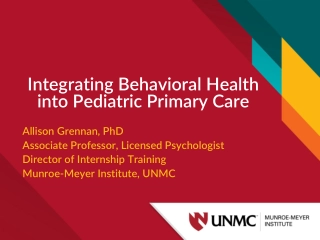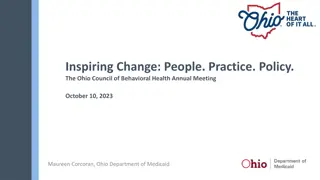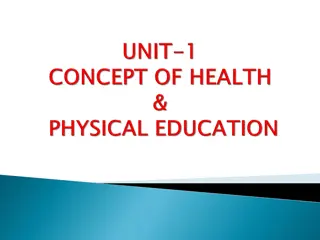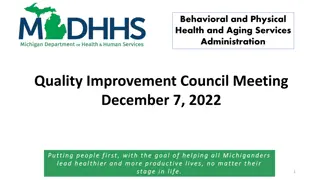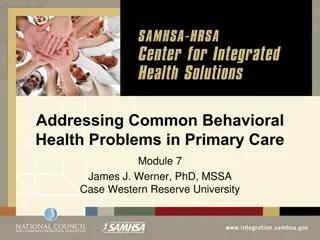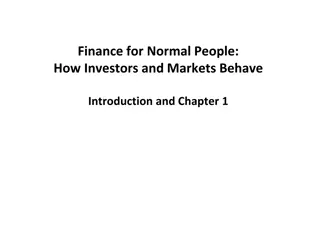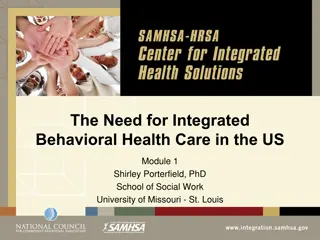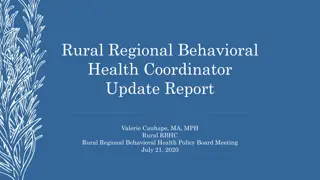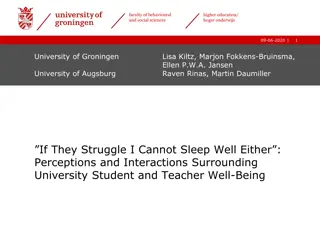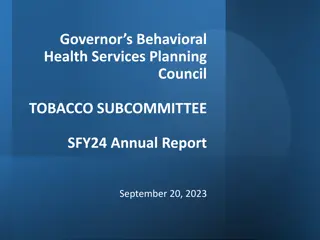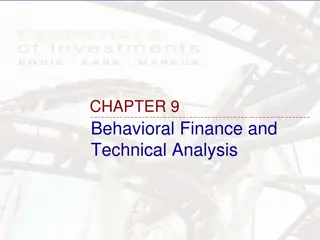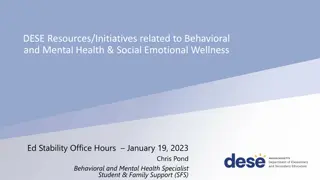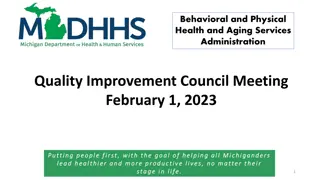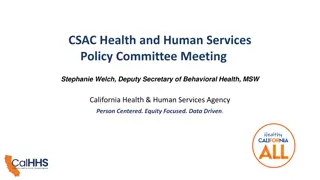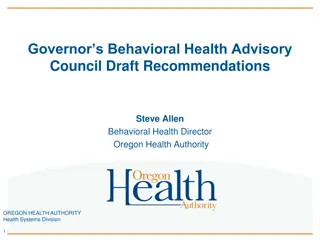Financial Well-Being in Behavioral Health Practice
This session delves into the importance of financial well-being in a behavioral health practice, exploring how it impacts mental health issues and overall well-being. Gain insights on defining financial well-being and behavioral health, and learn practical ways to address financial concerns in client cases.
Download Presentation

Please find below an Image/Link to download the presentation.
The content on the website is provided AS IS for your information and personal use only. It may not be sold, licensed, or shared on other websites without obtaining consent from the author.If you encounter any issues during the download, it is possible that the publisher has removed the file from their server.
You are allowed to download the files provided on this website for personal or commercial use, subject to the condition that they are used lawfully. All files are the property of their respective owners.
The content on the website is provided AS IS for your information and personal use only. It may not be sold, licensed, or shared on other websites without obtaining consent from the author.
E N D
Presentation Transcript
MONEY AND WELLNESS: THE INTERSECTIONS OF FINANCIAL & BEHAVIORAL HEALTH JEFFREY ANVARI-CLARK MA, MSW University of Maryland School of Social Work Financial Social Work Initiative October 1, 2020
OBJECTIVES This session will provide: Awareness: Define what financial well-being is and appreciate its importance in a behavioral health clinical practice context. Knowledge: Understand the interactions between financial and behavioral health (as pertaining to stress, anxiety, depressive disorders, with associated substance / medication induced symptoms, and other money disorders). Skill: Practice ways to engage, assess, and intervene in cases impacted by financial concerns.
--This video -- Understanding financial well-being (FWB) and its relationship with behavioral health (BH) Addressing the financial impact in client cases AGENDA -- Following -- Remote activity (on your own) Virtual small group discussion
WHY ARE FINANCIAL CONSIDERATIONS IMPORTANT? (After all, I didn t get into this profession for the money!) CSWE says so: 2015 EPAS / supporting materials include economic justice and financial content Grand Challenges for Social Work: Build financial capability for all, Reduce extreme economic inequality Your fellow practitioners say so: Practitioners can't address mental health issues because financial stress is in the way. You miss a big part of the picture by neglecting it: Financial well-being contributes as much to overall well-being as do job satisfaction, relationship support satisfaction, and health status combined. Work with the whole person Person-in-Environment
DEFINING: FINANCIAL WELL-BEING (FWB) Financial well-being is a state of being wherein a person can fully meet current and ongoing financial obligations, can feel secure in their financial future and is able to make choices that allow them to enjoy life. (Consumer Financial Protection Bureau, 2017)
DEFINING: BEHAVIORAL HEALTH (BH) A mental disorder is a syndrome characterized by clinically significant disturbance in an individual s cognition, emotion regulation, or behavior that reflects a dysfunction in the psychological, biological, or developmental processes underlying mental functioning. Mental disorders are usually associated with significant distress or disability in social, occupational, or other important activities. (From DSM-5, p20) Occupation: i.e. ability to engage in gainful employment, volunteering, child caring. Other activities: i.e. tasks requiring concentration and foresight, such as: Bill paying Budgeting Dealing with unexpected financial shocks (car repairs, emergency medical expenses)
IMPLICATIONS Inability to carry out financial activities can contribute to worsening BH conditions, adding life stressors. BH disorders can limit one s ability to carry out essential life activities.
CONCEPTUALIZING IMPLICATIONS Social Determinants of Behavioral Health are those factors (social, cultural, physical, policy) which shape people s behavioral health whether through direct impact or framing options. It impacts what life choices you see and technically are available from which to choose. Cause Disorder Cause of cause Job with volatile scheduling Insufficient funds to pay all bills Anxiety (Compton & Shim, 2015)
JORDONS STORY Jordon contacts your behavioral health clinic to make an appointment. They state that they are feeling really overwhelmed, having frequent panic attacks. Jordan works a retail job, has inconsistent (volatile) hours, and due to inability to regularly pay child support, is now having wages garnished.
Stress Disorders Acute Stress Disorder (ASD) Post Traumatic Stress Disorder (PTSD) Anxiety Disorders BEHAVIORAL HEALTH -AND- FINANCIAL WELL-BEING Generalized Anxiety Disorder (GAD) Panic Disorder Substance / Medication Induced Anxiety Disorder Depressive Disorders Major Depressive Disorder Persistent Depressive Disorder Substance / Medication Induced Depressive Disorder Other Money Disorders
UNDERSTANDING: BH STRESS DISORDERS Key Stress Disorders Acute Stress Disorder (ASD) Post Traumatic Stress Disorder (PTSD) As a result of trauma exposure Persistent negative beliefs about self, others, world Problems with concentration / bandwidth, sleep disturbance Causes significant impairment with social, occupational, and other areas of functioning Restricted sense of the future
IMPLICATIONS: BH STRESS DISORDERS Hypervigilance Sustained "epinephrine response" (stress hormone), elevated heartrate / blood pressure Lost time at work, increased hospital / healthcare bills Decreased income, decreased FWB, which increases stress Interferes with sleep Decreased focus / concentration and thereby bandwidth to carry out tasks requiring executive functioning (i.e. budgeting, scheduling, & bill paying) Increased susceptibility for undertaking risky behavior i.e. Gambling. Direct impact on financial stability, potential for significant losses Increases risk of self-harm as outcome, leading to potential increased medical bills, etc.
CASE ILLUSTRATION - GEORGIA Georgia is a mother of 3, who experiences back pain and has started using opioids to cope. Her long-time boyfriend was killed a few months ago and since then, she has been unable to hold a steady job. She is currently staying at a friend s place until she can figure things out.
UNDERSTANDING: BH ANXIETY DISORDERS Key Anxiety Disorders Generalized Anxiety Disorder (GAD) Panic Disorder Substance / Medication Induced Anxiety Disorder Persistent and excessive worries that the individual finds difficult to control - including finances! Panic or anxiety occur in association with intoxication with or withdrawal from the following: alcohol, caffeine, cannabis, and others. Substance used / coping mechanisms to counter the effects of anxiety and stress, provides temporary relief, requiring increasing amounts.
IMPLICATIONS: BH ANXIETY DISORDERS Excessive worry takes up time and energy. It impairs ability to Perform at work or home. Increased procrastination of tasks, missed bills and work. Encourage / consciously model confidence / financial capability in children. Increased financial / time outlay required to allay craving / cope.
CASE ILLUSTRATION JORDAN (REVISITED) Remember Jordan s panic attacks, wage garnishment, and owed child support? Jordan is afraid to discuss their situation with their landlord and has started missing rent payments. They were unable to gather the documents necessary for getting the financial assistance perhaps not for the owed child support (who wants to pay that?!) but for eviction prevention. They want to provide for their children, but are hiding the extent of their financial situation from them. It is becoming clear that anxiety is impacting FWB, and vice versa. What might be some initial steps to help them move forward?
UNDERSTANDING: BH DEPRESSIVE DISORDERS Key Depressive Disorders Major Depressive Disorder Persistent Depressive Disorder Substance / Medication Induced Depressive Disorder Following features can significantly affect the individual s capacity to function: Insomnia Fatigue or loss of energy Dysphoria (feeling sad) Suicidal ideation, attempts, thoughts of death
IMPLICATIONS: BH DEPRESSIVE DISORDERS Diminished ability to think or concentrate, indecisiveness Unable to function in cognitively demanding pursuits Feeling hopeless: Why bother paying bills? Ignoring large debts. Putting financial affairs in order (at an expedited pace)
CASE ILLUSTRATION - SALVADOR Salvador can t sleep at night. He often doesn t show up for work, and postpones appointments with his case manager. He procrastinates following through on goals. He drinks heavily, which he says helps him unwind, but he does notice outbursts of anger when he s not drinking. His lack of sufficient funds to send to family makes him feel worthless and a failure. Considering a scenario where he s experiencing depression, what approaches might we consider to help him through?
MONEY DISORDERS & OTHER BEHAVIORAL HEALTH CONDITIONS ...persistent, predictable, often rigid, patterns of self-destructive financial behaviors that cause significant stress, anxiety, emotional distress, and impairment in major areas of one s life (Klontz & Klontz, 2009 in Canale et al.) Financial Denial: defense mechanism in which money probs are minimized or avoided to escape psychological distress Financial Enabling: inability to say no when people continually ask for money Financial Dependence: reliance on others for nonwork income, fear of being cut off, anger & resentment, stifles motivation to succeed Financial Enmeshment: parent inappropriately discussing $ woes w/ minor child to cope with anxiety/stress *~Compulsive buying / Spending addiction: repetitive, associated with feelings of pleasure, adverse psycho/financial consequences *Gambling Disorder: persistent, problematic behavior leading to clinically significant impairment or distress * Hoarding Disorder: takes positive saving to an extreme Workaholism: extreme indulgence / absorption / compulsiveness resulting in relation & health problems Financial Infidelity: secrecy & dishonesty over money * in DSM-V Canale, A., Archuleta, K. L., & Klontz, B. T. (2015). Money disorders. In B. T. Klontz, S. L. Britt, & K. L. Archuleta (Eds.), Financial therapy: Theory, research, and practice (pp. 35 68). Springer.
VIGNETTE FOR SMALL GROUP DISCUSSION Paris and her 6 y/o daughter are currently living in a shelter. She reports having high blood pressure and was referred to your behavioral health clinic due to feeling really overwhelmed . (She smokes marijuana to cope.) She has a job doing environmental services at the local hospital. Her high blood pressure got out of hand recently and she spent several nights in the hospital. The health insurance provided by the hospital requires high-deductibles and now she has a large medical debt and the hospital is garnishing her wages. Paris stay in the shelter is coming to an end and she needs to find suitable living arrangements for her and her daughter. What are the various issues that need consideration? How would you approach this situation? What information do you need? How will you obtain it? From whom? Describe a potential intervention.
WHAT TO DO? -- ENGAGEMENT Stress disorders, anxiety, depression, addictions, etc. have treatment approaches that are often quite similar. Start with the methods you know. Set tone, expectations, how practitioner can help. (I work with the whole person. The more you can share, the better I can help.) Get them to paint the full picture . Acknowledge financial concerns (Learn to listen for these during intake. Probe for details as appropriate: nature, scope, affect.) Trust is generated by feeling heard and not judged. Listen without bias.
WHAT TO DO ENGAGEMENT (CONT) Become aware of your financial socialization history Understand your money personality / habitudes Get comfortable looking at financial documents Know what your money is doing, Build your financial self-efficacy Work on any areas that need addressing (debt, savings, goals, etc.) Do your own work. The better you understand your financial identity and get your house in order , the more comfortable you ll feel talking with others about financial topics. When you feel comfortable, you ll help the client feel more comfortable.
WHAT TO DO? -- ASSESSMENT Informal: Help me understand what s going on with [financial issue] + Motivational Interviewing to craft treatment plan. What to consider: Does monthly income cover ongoing expenses? Is there any money for unexpected events? Is income stable every 2 weeks or month or is it volatile? Are they receiving / eligible for any benefits or emergency assistance funding? Is there an impact on working ability? Are there debts impacting the picture? How are financial concerns affecting their life?
WHAT TO DO? -- FORMAL ASSESSMENT Formal: Use assessments to a) obtain information, and b) jumpstart a conversation. Type and scope of assessment depends on nature of practice / time. AZ Self-Sufficiency Matrix APR Financial Stress Scale Financial Anxiety Scale Financial Well-Being Scale Socio-Economic Empowerment Assessment Money Habitudes (for basic needs) (for emotional development)
INTERVENTION Direct: Provide / facilitate the needed intervention, focused on the financial issue. Referred: If outside the scope of your service, refer client to a partner organization for services and resources (money and in-kind). Use of Accountability Partner: In combination with direct/referred, to provide more frequent / higher touch support.
INTERVENING: BH STRESS DISORDERS Stop underlying cause: Address by getting out of harmful environment (i.e. DV/IPV) - THEN can work on financial considerations. However, know that FWB has to be addressed as part of putting life back together, otherwise can exacerbate symptoms. Use established cognitive therapies, integrate financial considerations. Change beliefs around capacity to manage finances? Identify discrepancies between prior beliefs based upon traumatic event and new information; who can and does manage the family s money (now that client is on their own).
INTERVENING: BH ANXIETY DISORDERS Employee Assistance Programs (if available) provide targeted supports Cognitive therapy w/ other behavioral techniques (to address financial components) Financial Therapy Develop skills to manage (financial) worries Jotting down the various financial tasks to be accomplished Face the monster and make a plan (open the bills and tally the debts) Don t make A budget. Learn how TO budget in accordance with values. Cut back on anxiety inducing substances
INTERVENING: BH DEPRESSIVE DISORDERS Could be similar as Anxiety Disorders, however May need social / emotional support (Budgeting jointly with trusted person, have a nudge , simply following up can be social support). Design goals accordingly to incorporate accompaniment structure. If sudden arrangement of affairs, paying off debts, etc. of someone who is generally not impulsive, but has been in pain, feeling hopeless, and now feels peace, consider for suicidal ideation and address as appropriate.
INTERVENTIONS OTHER CONSIDERATIONS Learn to recognize what you can help with, and when a financial therapy referral is appropriate Referrals could include: Gov t services, 2-1-1 United Way, Community Action Agencies, and smaller non-profits. Get out and network! Clients will tell you where they ve already tried. Have an updated referral list that can quickly be emailed AND texted. Name, contact info, services rendered, eligibility considerations, quirks .
INTERVENTIONS OTHER CONSIDERATIONS, CONT Financial education is usually NOT effective. Skill development through a process of behavior change, seizing upon teachable moments, is much more effective. But it takes time. And effort. With setbacks. And small wins that need to be celebrated. Things to work on: goal development, budgeting, credit repair, developing emergency savings, a sense of financial self-efficacy, accessing appropriate and affordable financial products / services
Integrated care models Health insurance and medical debt Employee Assistance Programs (EAPs) EMERGING ISSUES Automation & Just-in-Time scheduling Boom in unprepared retirees Smart phones and social media
FWB is about meeting needs, feeling secure, and making choices, now and in the future. FWB and BH can have a bi-directional and/or mediated relationship. Complex environments shape what choices individuals make, and how. KEY TAKE-AWAYS Treat BH disorders holistically understand financial causes and effects.
FOR THE SMALL GROUP DISCUSSION: Prepare some responses for the vignette (Paris). Trial 3 or 4 assessments for yourself, including the FWB Scale (CFPB), and identify the contexts for appropriate use. HOMEWORK
ASSESSMENTS & TOOLS Hawkins, R. L., & Kim, E. J. (2012). The socio-economic empowerment assessment: Addressing poverty and economic distress in clients. Clinical Social Work Journal, 40(2), 194 202. https://doi.org/10.1007/s10615-011-0335-4 The Socio-Economic Empowerment Assessment Consumer Financial Protection Bureau. (n.d.). Financial well-being resources. Consumer Financial Protection Bureau. Retrieved May 9, 2020, from https://www.consumerfinance.gov/practitioner-resources/financial-well-being-resources/ Financial Well-Being (FWB) Scale Questionnaire online / paper long or short Case Study: The Arizona Evaluation Project on Homelessness. (2015, November 23). ASPE. https://aspe.hhs.gov/report/toward-understanding-homelessness-2007-national-symposium- homelessness-research-accountability-cost-effectiveness-and-program-performance- progress-1998/case-study-arizona-evaluation-project Self-Sufficiency Matrix (HHS, Arizona Evaluation Project on Homelessness) de Souza, J. A., Yap, B. J., Wroblewski, K., Blinder, V., Ara jo, F. S., Hlubocky, F. J., Cella, D. (2017). Measuring financial toxicity as a clinically relevant patient-reported outcome: The validation of the COmprehensive Score for financial Toxicity (COST). Cancer, 123(3), 476 484. https://doi.org/10.1002/cncr.30369 COmprehensive Score for financial Toxicity (COST-FACIT) Sages, R. A., Griesdorn, T. S., Gudmunson, C. G., & Archuleta, K. L. (2015). Assessment in financial therapy. In B. T. Klontz, S. L. Britt, & K. L. Archuleta (Eds.), Financial therapy: Theory, research, and practice (pp. 69 86). Springer. Financial Anxiety Scale (FAS) Heo, W., Cho, S. H., & Lee, P. (2020). APR Financial Stress Scale: Development and validation of a multidimensional measurement. Journal of Financial Therapy, 11(1). https://doi.org/10.4148/1944-9771.1216 APR Financial Stress Scale Solomon, S. (n.d.). Money Habitudes. https://www.moneyhabitudes.com/ Money Habitudes
Callahan, C., Frey, J. J., & Imboden, R. (Eds.). (2020). The Routledge handbook on financial social work: Direct practice with vulnerable populations (1st ed.). Taylor & Francis. ADDITIONAL RESOURCES Klontz, B. T., Britt, S. L., & Archuleta, K. L. (Eds.). (2015). Financial therapy: Theory, research, and practice. Springer. Journal of Financial Therapy (open access): https://newprairiepress.org/jft/
American Psychiatric Association. (2013). Diagnostic and statistical manual of mental disorders (5th ed.). Arlington, VA: American Psychiatric Association. Compton, M. T., & Shim, R. S. (Eds.). (2015). The social determinants of mental health. Washington, DC: American Psychiatric Publishing. Consumer Financial Protection Bureau. (2017). CFPB Financial well-being scale. [Measurement instrument]. Retrieved from https://www.consumerfinance.gov/data-research/research-reports/financial- well-being-scale/ Hoopes, S. (2018). ALICE Report. Retrieved from United Way ALICE Project website: https://www.uwcm.org/main/alice/ Kenyon, C., Sandel, M., Silverstein, M., & et al. (2007). Revisiting the social history for child health. Pediatrics, 120(3), e734 e738. REFERENCES Prosperity Now. (2019). Prosperity Now Scorecard. Retrieved October 18, 2019, from https://scorecard.prosperitynow.org/data-by- issue#finance/outcome/asset-poverty-rate Substance Abuse and Mental Health Services Administration. (2012). Results from the 2010 National Survey on Drug Use and Health: Mental Health Findings (NSDUH Series H-42, HHS Publication No. [SMA] 11-4667). Rockville, Maryland. Thyer, B. A., & Wodarski, J. S. (1998). Handbook of empirical social work practice, Vol 1. New York: J. Wiley. U.S. Department of Health & Human Services. (2015, November 23). Poverty Guidelines. Retrieved October 18, 2019, from ASPE website: https://aspe.hhs.gov/poverty-guidelines
Jeffrey Anvari-Clark, MA, MSW jeffrey.clark@ssw.umaryland.edu THANK YOU jeffreyanvariclark.com


